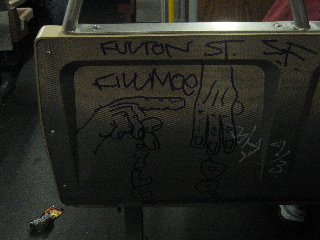March 02, 2004
You're it!
Six years of taking digital photographs of local graffiti, and I plumb forgot to snap a picture the first time my building was tagged.
Props to my next-door neighbours for sending me email about this: I read their note on the way home, marched straight into the basement to get the house paint and a brush, and bob's your uncle.
The sticker is its own reward
I encourage my neighbours, colleagues, and friends to vote: one great way is by wearing an "I Voted Today" sticker, a simple and direct reminder that we're participating in the electoral process. Another way that casting one's vote is made easier in San Francisco is through the provisional voting: a voter may participate at any polling place, as long as they present proper ID. I've brought some of my colleagues, who might have otherwise lingered too long at work, to my polling place.
But the poor organisation of polling places combined with the lack of training or uniform instructions for officals at the polling places leads to an offensive voting environment.
Today I suggested to Anna that we go vote together, and then get a cup of coffee to celebrate. However, the officials at our local polling place turned her away because it wasn't her regular polling place. She and I both knew that this wasn't right, but I've never seen a fruitful discussion take place at a polling place (which in this city and county are not necessarily public locations such as schools, libraries, or civic buildings, but cafés, private basements, church offices, and the like).
The process with which I'm familiar in San Francisco is a slightly tedious but usefully redundant one: one polling place official (PPO) checks my address and name against a printer roster, and then nods to another PPO, who finds the name on a second roster and has me countersign. I then receive a blue privacy folder with the ballot sheet(s) in it, and retire to a plastic booth where I connect the dots. The process is synchronous: all of these steps must complete for each person before the PPOs begin processing the next voter.
Today was a demonstration of how little training the PPOs have. As I showed my ID (State Driver's License) to the first PPO, a second began collating the ballot sheets for me:I had to tell him my part affiliation, so that he could put the correct primary sheet into the folder. He then got up and went away from the table, leaving two other PPOs to finish up. The first had found my name on the first roster, but the second couldn't find my strongly-ethnic name, and was at the point of giving up when I pointed to it. She then spent some time comparing my ID with the printed name, and just as she realised that the two matched, couldn't find a pen to tick off my name.
They abandoned the folder that the first official had prepared, and began assembling a new one ("I'm a registered Democrat", I repeated). When I got to the booth, I found that I had two primary ballots, one Democrat and one Independent, but no ballot for state and local propositions and offices. The officials didn't grasp my position, and finally insisted that we start over. I pointed out that they needed to give me one from that stack, and one from that stack, and then made my way back to a booth. I don't know what happened to the first set of ballots I started on; they took them back, but I don't know whether they were physically discarded or simply put aside.
Anna reported that a polling official at the church where she voted couldn't find her name, either. One of the PPO responsibilities is helping voters understand instructions and ballots; how can they accomplish this, when they can't collate the ballots or alphabetize unfamiliar names?
In the state election last November, I cast ballots twice; the first round were invalidated (the PPO placed it in a paper envelope, which he in turn labelled INVALID with a marking pen). The second batch I fed into the Eagle computer.
